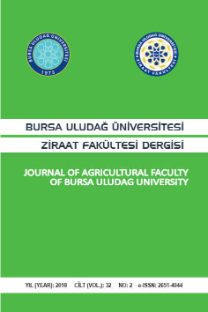Yumurta tavuğu rasyonuna ilave edilen organik asit karmasının ince bağırsak pH'sı ve mikroflorası üzerine etkileri
Bu çalışmada, yumurta tavuğu rasyonlarına farklı düzeylerde (% 0.5, 1.0 ve 1.5) ilave edilen organik asit karmasının (formik ve propiyonik asit ile bunların amonyum tuzları) ince bağırsak pH’sı ve mikroflorası üzerine olan etkileri incelenmiştir. Araştırmada toplam 180 adet 20 haftalık yaştaki Lohmann LSL tipi yumurta tavuğu kullanılmıştır. Çalışma her biri 45 adet tavuktan meydana gelen 4 deneme grubu ile yürütülmüştür. Her bir de neme grubu da 15 tavuk içeren 3 alt gruba ayrılmıştır. Kontrol grubundaki yumurtacı tavuklar temel rasyonla, deneme gruplarındaki tavuklar ise temel rasyona % 0.5, 1.0 ve 1.5 düzeylerinde organik asit ilavesiyle beslen mişlerdir. Araştırma 16 hafta sürdürülmüştür. Araştırma sonunda incebağırsak pH’sı değerinde deneme grupla rında kontrol grubuyla kıyaslandığında önemli (p< 0.001) düşüşler belirlenmiştir. İnce bağırsak mikroflorasında önemli değişimler gözlenmiştir. Aerobik bakteri sayısı duodenumda azalma jejenum ve ileumda artış göstermiş tir. Maya sayısı tüm deneme gruplarında varyasyon gösterirken organik asit ilavesi yapılan deneme gruplarında E.coli sayısında önemli azalmalar tespit edilmiştir. Sonuç olarak rasyonlara organik asit ilavesinin ince bağırsak pH’sında ve ince bağırsak mikroflorasında önemli değişimlere neden olduğu saptanmıştır.
Anahtar Kelimeler:
bağırsaklar, onikiparmak bağırsağı, tavuk beslenmesi, mikrobiyal flora, yem katkı maddeleri, yem zenginleştiriciler, yumurta tavuğu, ileum, bağırsak mikroorganizmaları, organik asitler, pH, ince bağırsak
The ınfluence of dietary organic acid supplementation on pH and microflora in small ıntestines of laying hens
This study was conducted to determine the effects of different levels (0.5, 1.0, and 1.5 %) of dietary organic acid mixture on intestinal pH and microflora of laying hens. A total of one hundred and eighty, 20 weeks old, Lohmann LSL type white laying hens were assigned to 4 groups (45 hens per group) with 3 replicates of 15 hens each. The hens in control group were fed with a basal diet (control group) and experimental groups I, II and III were fed basal diet supplemented with 0.5, 1.0, and 1.5 % of organic acid mixture respectively. The experi mental period lasted 16 weeks. At the end of the study, a significant decline was determined in intestinal pH values of experimental groups when compared to control group (p<0.001). Intestinal microflora showed impor tant variations (p<0.001). Aerobic bacteria counts decreased in duodenum but there was an increase in jejunum and ileum. Yeast count showed variations in all of the experimental groups. In addition, a significant decline (p<0.001) in E.coli counts was determined in the experimental groups containing organic acids. In the light of these findings it was concluded that organic acid supplementation may lead important changes in pH value of small intestines and cause significant variations in microbial flora of gut in hens.
Keywords:
intestines, duodenum, fowl feeding, microbial flora, feed additives, feed supplements, hens, ileum, intestinal microorganisms, organic acids, pH, small intestine,
___
1. GAUTHİER R. Intestinal health, the key to pro ductivity (the case of organic acids). XXVII. Con vencion. ANECA-WPDC, Puerto Vallarta, Jal, Mexico. 30 April 2002.2. ADAMS C, 1999, Poultry and dietary acids. Feed Int. 20, 14-19.
3. LANGHOUT P. New additives for broiler chickens. World Poultry-Elsevier. 2000; 3: 22-28
4. HYDEN M. Protected acid additives. Feed Int. July, 2000. 14-16.
5. AOAC .1984. Official Methods of Analysis of the Association of Official Analytical Chemist. 14th ed., Arlington, Virginia.
6. TSE .: Hayvan yemleri- metabolik (çevrilebilir) enerji tayini (kimyasal metot). TSE No: 9610. Türk Standartları Enstitüsü. Ankara. 1991.
7. ANONYMOUS, 1992, Yem hammaddeleri ve karma yemlerde koliform grubu bakteri ve E.coli sayımına ilişkin yöntem. En muhtemel sayı (EMS). Official Newspaper-TR, 21 Jan No: 21118.
8. QUİNN P, CARTER ME, MARKEY BK, CARTER GR. Clinical Veterinary Microbiology. Wolfe Publ. 1994.
9. SÜMBÜLOGLU K, SÜMBÜLOGLU V. Biyoistatistik. 6. Baskı. Özdemir yayıncılık, An kara.1995.
10. KAHRAMAN R, ABAS I, BASTON K, TANÖR MA, KOCABAGLI N, ALP M. Effects of organic acids and yeast on performance, ileum pH and en terobactericeae population of broilers. Yutav’ 99 Internatinal Pouktry Fair and Conference, Istan bul. 3-6. 1999.
11. DENLI M, OKAN F, CELIK K. Effect of dietary probiotic, organic acid and antibiotic supplemen tation to diets on broiler performance and carcass yield. Pakistan J. of Nutr. 2003; 2: 89-91.
12. THOMPSON JL, HİNTON M. Antibacterial activity of formic and propionic acids in the diet of hens on Salmonellas in the crop. Br. Poult Sci. 1997; 38: 59-67.
13. KIRKPINAR F, AYHAN V, BOZKURT M. The effects of organic acid mixed and probiotic on performance, intestinal pH and viscosity in broilers. International Animal Husbandry Con gress. İzmir, Türkiye. 21-24 September. 1999. 463-467.
14. CAMPENHOUT LV, HEME JV, VANDENKERCHOVE J, MOLLEN K, SAS B. Performance of an alternative to antibiotics in broilers with high intestinal counts of clostridium perfingens. Erişim: http://www.keminonline.com/europe/other/antibio tic-alternative.shtml.2000.
15. ÖZTÜRK E, YILDIRIM A, EROĞLU C. Organic acids supplementation to the diets can not improve performance and intestinal microbiological characteristics of broiler. II. National Animal Nutrition Congress. 18-20 September, Konya. 2003. 194-197.
- ISSN: 1301-3173
- Yayın Aralığı: Yılda 2 Sayı
- Başlangıç: 1981
- Yayıncı: Ahmet Akkoç
Sayıdaki Diğer Makaleler
Derya YEŞİLBAĞ, ALPER ÇİFTCİ, Mehmet AKAN
Occurrence of aflatoxin B¹ and T-2 toxin in feed and raw ıngredients used for animal feeding stuffs
H. Hüseyin ORUÇ, Murat CENGİZ, İlknur UZUNOĞLU
Siyah alaca ve esmer ineklerde subklinik mastitis için risk faktörleri
Sığır etlerinde streptomisin ve sulfametazin (Sulfadimidin) kalıntıları
H. Hüseyin ORUÇ, MURAT CENGİZ, Deniz BAĞDAŞ, İlknur UZUNOĞLU
Sığır etlerinde zeranol, dietilstilbestrol, klenbuterol, 17B-östradiol ve testosteron kalıntıları
H. Hüseyin ORUÇ, MURAT CENGİZ, Deniz BAĞDAŞ, İlknur UZUNOĞLU
Ochratoxin a levels in different types of bread and flour
MURAT CENGİZ, H. Hüseyin ORUÇ, İlknur UZUNOĞLU, SONGÜL SONAL
